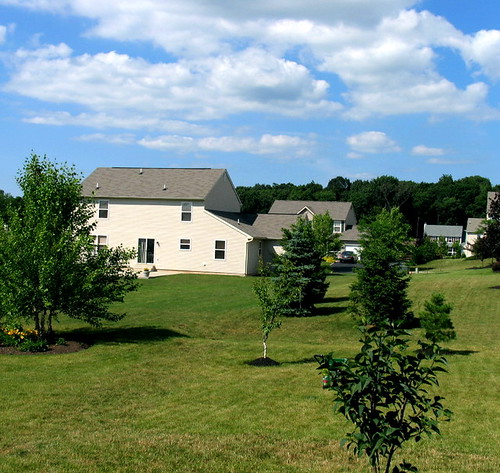
In a bizarre reversal of urban decay, many homes and streets in American suburbs are being abandoned due to a number of reasons, including the fallout of the sub-prime mortgage crisis. The Atlantic magazine’s Christopher B. Leinberger wonders if the ‘burbs will become 21st century slums.
Strange days are upon the residents of many a suburban cul-de-sac. Once-tidy yards have become overgrown, as the houses they front have gone vacant. Signs of physical and social disorder are spreading.
At Windy Ridge, a recently built starter-home development seven miles northwest of Charlotte, North Carolina, 81 of the community’s 132 small, vinyl-sided houses were in foreclosure as of late last year. Vandals have kicked in doors and stripped the copper wire from vacant houses; drug users and homeless people have furtively moved in. In December, after a stray bullet blasted through her son’s bedroom and into her own, Laurie Talbot, who’d moved to Windy Ridge from New York in 2005, told The Charlotte Observer, “I thought I’d bought a home in Pleasantville. I never imagined in my wildest dreams that stuff like this would happen.”
…
[T]he crisis has indeed catalyzed or intensified social problems in many communities. But the story of vacant suburban homes and declining suburban neighborhoods did not begin with the crisis, and will not end with it. A structural change is under way in the housing mar[ket—a major shift in the way many Americans want to live and work….
For 60 years, Americans have pushed steadily into the suburbs, transforming the landscape and (until recently) leaving cities behind. But today the pendulum is swinging back toward urban living, and there are many reasons to believe this swing will continue. As it does, many low-density suburbs and McMansion subdivisions, including some that are lovely and affluent today, may become what inner cities became in the 1960s and ’70s—slums characterized by poverty, crime, and decay.
photo by Mad Abandon on Flickr

3 comments
James Kunstler’s been presciently calling the ‘burbs “The National Automobile Slum” for quite some time now. After the shakeout of the financial structuring that allowed lots of suckers with marginal credit to buy homes they couldn’t afford, the decline of cheap energy will make the entire living arrangement untenable. It’ll either have to re-densify or go back to farmland, if that’s even possible.
In looking at various suburban sprawls around the continent (such as that I noticed clotting along and around Highway 15 on the way up to the Laurentians yesterday), I’ve often imagined some sort of post-peak-oil-crash scenario where a New Deal-style Civilian Conservation Corps or National Works Administration hires the destitute to go around dismantling and recycling these developments in preparation for turning them back into farmland and woodlands. But that’s probably a bit optimistic.
I had to laugh when I read about the residents of Reston Town Centre being able to walk from home to movies and restaurants, as if that was something special; in the (then) medium-small town I grew up in, that was normal. I walked a block and half to school by myself in the early grades… My dad walked to work when his job was there; when he worked in the city, he could walk to the train station if he had time; otherwise it was a short drive.
But even then, our most affordable grocery store was in the first mall in town (a generically named Shopping Centre), and we drove there… Now the state highway just outside town (several K) which used to be mostly farm-lined, is one big clot of developments, corporate parks and malls. The town, a fairly wealthy one, has nonetheless had a hard time keeping basic services sorts of stores on its main street as the mall chains have sucked business out of the core. Now many stores that used to serve the working and middleclass folks are replaced by upscale ones.
Ballard-esque!